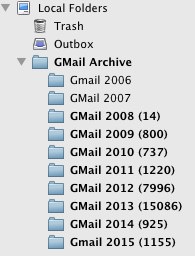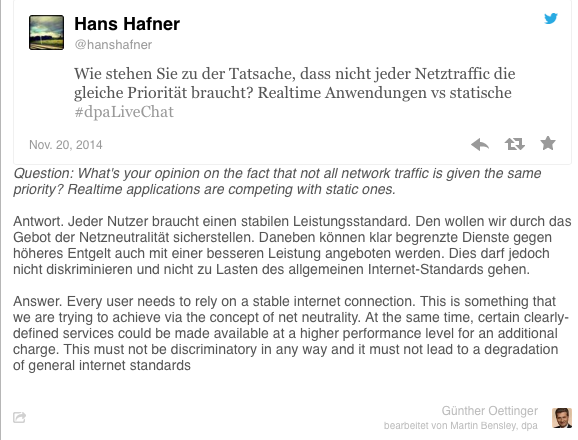Vielleicht sind sie aber auch nur beleidigt, weil meinungsbasierte Argumente nicht tragbar sind?
Tag Archives: internet
Musikstreaming ekelt mich an – Radio SRF 3 – Schweizer Radio und Fernsehen
Streame ich Musik, fühlt sich das für mich an, als hätte ich keinen eigenen Kleiderschrank.
Source: Musikstreaming ekelt mich an – Radio SRF 3 – Schweizer Radio und Fernsehen
Turning off Javascript
Oh. My. God. I have had NoScript enabled which pretty much claims to do the same thing, but it still seems to slow the browser down considerably. Not to mention the constantly nagging dialog boxes.
If you actually turn off Javascript in Firefox like so (see image), the browsing speed increase is tremendous. I was surprised myself.
Sure, it feels like you’re surfing the web in 1997 and I had to turn Javascript back on in order to be able to upload the above image to this posting, but boy is it quick.
And I suspect that there is _a lot_ of room for speed improvement with clever coding. Come on coders!! Do it! Save those CPU cycles!
Hear, hear: Silicon Valley moguls aren’t going to save the arts: The ugly truths of patronage go back centuries – Salon.com
Tech industry types think they’re the best thing ever to happen to music and the arts. Don’t believe them
Technology company and musicians – a love relationship
I just looked at the (German) Wikipedia page of Twitter and found this table there. It’s pretty self-explanatory, so I don’t think the German matters.
What I find interesting is, that 7 (!) out of the top 10 accounts with the most followers are from musicians. And the tech world keeps telling musicians that their work is a commodity and treats it as basically worthless. Better yet: they™ run a huge campaign to effectively undermine every effort to create a level playing field in the digital world.
But thinking a little longer about this I can sort of understand: it must be a terrible feeling that there are people out there who manage to deeply touch and affect people with a simple song.
Source: Twitter – Wikipedia
I really did leave Gmail behind
Notice the sharp dropoff in messages from 2013 to 2014:
The reason why there are messages at all is that I still have a couple of alerts that get delivered to that address.
And contrary to many technophiles I’m still alive, I can still communicate with everybody, I get everything done in other words: we don’t necessarily need Google for everything.
Although I wish that the problem of search would be solved far better than it is now. Even though Google is doing a great job, it could be much better:
downrank obvious content farms
remove illegal content from the results
remove scammy websites from the ad-network
I know it’s not easy, but when has Google every shied away from a hard challenge? You can do it, can’t you?
Digital Business Models Should Have to Follow the Law, Too – HBR
The article linked below is extremely sad. I know this for a fact since I`m working in the industry that`s most affected by this sort of behavior.
And what`s particularly sad is that people all over the world who proclaim to be music lovers ignore and outright laugh at the challenges and exploitation that culture creators face.
Digital Business Models Should Have to Follow the Law, Too – HBR.
Blind justice: Google lawsuit silences elected state prosecutor
Please read this article:
Google and Facebook are increasingly resembling “suprastates” to whom national – and perhaps international – law doesn’t apply. But if you think that replacing laws with a free-for-all leads to anything other than the strong crushing the weak, then I have a bridge to sell you.
Revolution eating its children: Why We Need To Stop “Disrupting”
To all the dear people who think copyright “monopoly” is the opposite of sliced bread, read this.
You too, tech journalists and populous of the copyleft echo chamber.
Rivalry doesn’t just cut your profits, it makes companies focus on defeating their competitors instead of differentiating their own brand. In an interview with The Guardian, Thiel said that great businesses caught up in disrupting other businesses is like a successful career focused on disrupting someone else’s career instead of doing something valuable on your own. “So why do people believe that competition is healthy?” he asks.
Why We Need To Stop “Disrupting” | Fast Company | Business + Innovation.
Live-Chat: Sie fragen, Oettinger antwortet | shz.de
Für dpa hat Günter Öttinger (EU Digital Kommissar) heute ein paar Fragen beantwortet. Unter anderem auch eine meiner Fragen. Leider die uninteressanteste, das war aber natürlich seine Entscheidung.
Wo sehen Sie Herr @GOettingerEU die Trennlinie zwischen privat und öffentlich im Falle Verbreitung kultureller Werke? #dpaLiveChat
— Hans Hafner (@hanshafner) November 20, 2014
Wie definieren Sie in Zukunft die unterschiedliche Anforderung im UrhR von Urhebern aus der Wissenschaft/Forschung <-> Kultur #dpaLiveChat — Hans Hafner (@hanshafner) November 20, 2014
Wo sehen Sie die Trennlinie zwischen privat und öffentlich im Falle Verbreitung kultureller Werke? #dpaLiveChat
— Hans Hafner (@hanshafner) November 20, 2014
Wie stehen Sie zur Vergütungspflicht bei Drittverwertung und welche Werkzeuge möchten Sie Urhebern geben? #dpaLiveChat — Hans Hafner (@hanshafner) November 20, 2014
Aus der Antwort kann man aber heraushören, dass wohl “fast-lanes” geplant werden. So sehr ich diese ablehne, weil das Internet so, wie es ist schon ganz cool ist, so sehr weiß ich aber auch, dass das der Weg sein wird, wie wieder mehr Geld in das ganze Internet kommt.
Wir können nur hoffen, dass die Plattformen ordentlich weiterreichen / abrechnen und unsere Verwertungsgesellschaften/Labels/Verlage/ uns daran auch gut genug beteiligen.
Es gibt also noch viel zu tun in der Zukunft.



